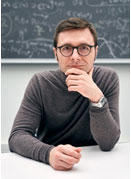SPS Webinar Series 6 April 2021: Signal Processing And Computational imagE formation (SPACE)

SPS Webinar Series: SPACE
(Signal Processing And Computational imagE formation)
Upcoming Webinar Series 2 @ SPACE
Learning the Geometry of Wave-Based Imaging
6 April 2021: Dr. Ivan Dokmanić
| Presenter: Date: Time: Duration: Register: |
Dr. Ivan Dokmanić, University of Basel, Switzerland 6 April 2021 10:00 AM ET (New York time) Approximately 1 hour Webinar Registration |

Abstract:
A key difficulty in wave imaging with a varying background wave speed is that the medium “bends” the waves differently depending on their position and direction. This space-bending geometry makes the inductive biases of the usual neural networks (say, convolutional) unsuitable for many wave-based inverse problems. To address this issue, we propose the FIONet—a neural architecture derived from wave physics. Instead of directly using the wave equation, the FIONet models the geometry of wave propagation as captured by the Fourier integral operators (FIOs). FIOs appear in the description of a wide range of wave-based imaging modalities, from seismology and radar to Doppler and ultrasound. Their geometry is characterized by how they propagate singularities; we show how to learn it using optimal transport in the wave packet representation. The FIONet performs significantly better than strong baselines on a number of problems, especially when applied to out-of-distribution data.
About the presenter:

Ivan Dokmanić is an Associate Professor in the Department of Mathematics and Computer Science at the University of Basel, Switzerland.
From 2016 to 2019, he was an Assistant Professor in the Coordinated Science Laboratory at the University of Illinois at Urbana-Champaign, where he now holds an adjunct appointment. He received a diploma in electrical engineering from the University of Zagreb in 2007, the Ph.D. degree in computer science from EPFL in 2015, and completed a postdoctoral position at Institut Langevin and Ecole Normale Supérieure in Paris between 2015 and 2016. Before that he was a teaching assistant at the University of Zagreb, a codec developer for MainConcept AG, Aachen, and a digital audio effects designer for Little Endian Ltd., Zagreb. His research interests lie between inverse problems, machine learning, and signal processing.
Dr. Dokmanić received the Best Student Paper Award at ICASSP 2011, a Google Ph.D. Fellowship, an EPFL Outstanding Doctoral Thesis Award, and a Google Faculty Research Award. In 2019, the European Research Council (ERC) awarded him a Starting Grant. A side note: He used to be the singer and the lead guitarist of Ivan and the Terribles, featuring Martin Vetterli on bass, Paolo Prandoni on everything, and Marta Martinez-Cámara on saxophone.

